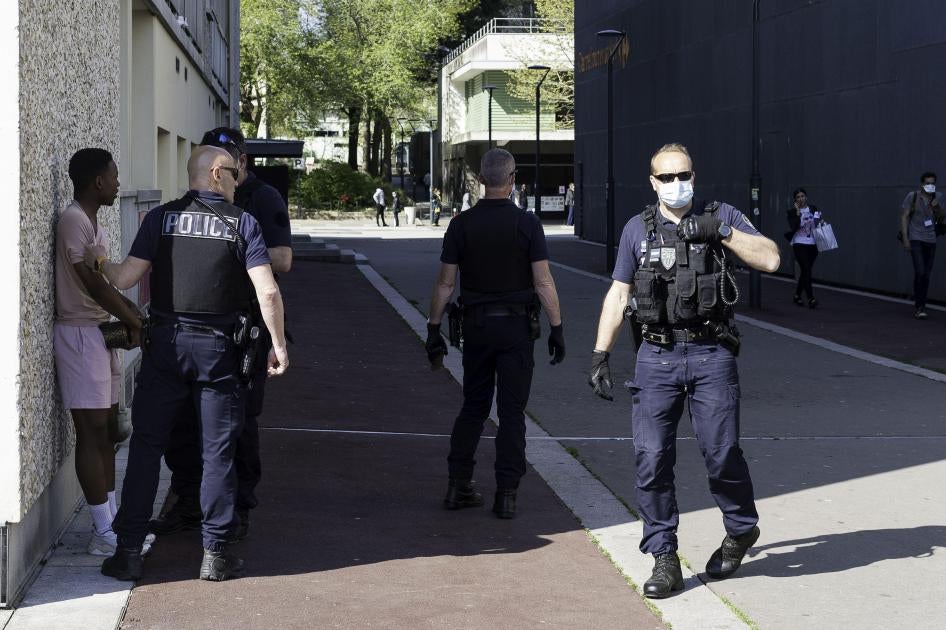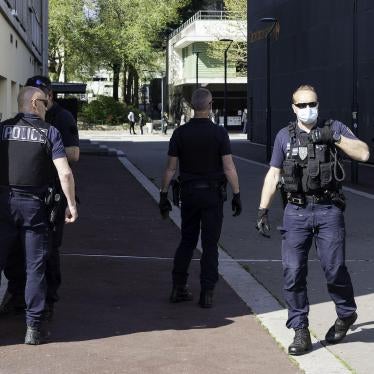It’s been three months since police shot and killed Nahel M., a 17-year-old French teenager of North African descent. Nahel’s tragic killing adds to at least 15 fatal police traffic stops in France in 2022.
This 54th session of the UN Human Rights Council presents an opportune moment to build on concerns about systemic racism within French law enforcement raised by many UN human rights bodies.
What has caused the recent rise in fatal police stops in France? For one, the law on public security adopted in 2017 dangerously broadened the scope of when police may use their weapons, going well beyond the standard of necessity and proportionality that previously governed police use of force in the country.
But Nahel’s killing needs to be understood in the context of a decades-long pattern of French police disproportionally targeting individuals on the basis of race and ethnicity. Ethnic profiling by French police has been extensively documented and condemned not just by national and international civil society groups, but also by international and national human rights bodies.
In 2021, Human Rights Watch and five French and international human rights groups filed a class action suit against the French state to demand reforms that end systemic ethnic profiling by the police. Yet the French government continues to deny systemic racism exits within its police forces.
In its latest Action Plan on Anti-Racism, the French government completely failed to address the practice of racial and ethnic profiling by police, missing a key opportunity to combat discriminatory police practices, including by requiring police officers to document demographics from police stops.
International experts and the European Union have said that requiring such documentation and collecting disaggregated data on race and ethnicity would allow authorities and advocates to better quantify and tackle these manifestations of structural racism. However, French authorities continue to ban such data collection, thwarting transparency and undermining solutions.
Nahel’s killing should have been an inflection point for France, illustrating that business can’t go on as usual and that France is part of a global discussion on the ways in which policing replicates and exacerbates broader patterns of societal discrimination.
Instead, shortly after Nahel’s killing, much of the discourse sidetracked to focus negatively on how some communities were responding. Nahel grew up as an only child in the Parisian suburb of Nanterre. In this and other urban suburbs, youth face over-policing based on race and ethnicity along with structural economic and social inequalities.
Following Nahel’s killing, not a day went by without officials and the media using stigmatizing and racially charged language to describe the expressions of anger, property damage, and protest that some members of these communities undertook in reaction to Nahel’s killing. This discourse seemingly ignored the geographical and racial diversity of the protests.
Two major police-affiliated unions–the Alliance Police Nationale and UNSA Police–quickly said they were at “war” with “savage hordes” and “pests.” Police used this racialized fearmongering to justify the repression of protests with violence and harassment.
Policymakers largely reduced protesters, who expressed anger and called for change, to violent “rioters.” They took to the streets not just for Nahel, but for all those who have experienced disproportionate targeting, violence, and trauma at the hands of French police.
This twisting of the narrative distracts from the failure of French officials to engage in the necessary steps to end abusive policing and to make communities safer through structural economic solutions and investments that allow them to thrive.
Officials paid far more attention to the property damage and other reactions by justifiably angry community members, than to the central issue of how racism and discrimination impact French society. France was the second largest colonizer in the world and created colonies rooted in a system of racial hierarchy.
Countless multigenerational people tracing their roots to those former colonies now live in France and continue to experience racism, economic marginalization, and the continuing legacies of colonialism. Denying the existence of racism and race in France denies affected communities their ability to raise and seek state resolution of structural problems that affect their everyday lives.
In the coming year, there are several international human rights mechanisms and bodies that can address this issue head on. The International Expert Mechanism to Advance Racial Justice and Equality in Law Enforcement (EMLER), created in 2021 by the UN Human Rights Council following the murder of George Floyd by police in the US, will present a report at the upcoming Human Rights Council session, followed by a dialogue that offers an opportunity for scrutiny of France’s failure to end discriminatory police practices.
France will also be required to publicly respond to the recommendations it received under what is called the “Universal Periodic Review,” which is a peer review mechanism among UN member states to monitor compliance with their obligations under international human rights law. During its review in May, France received several recommendations from other countries to address systemic racism within its police force and in the coming sessions states should build off these recommendations and remind France that compliance with human rights obligations is not optional.
France should listen to international rights bodies by acknowledging the reality that structural racism exists, reckon with it and act to counter it head on, no matter how uncomfortable the conversations.









